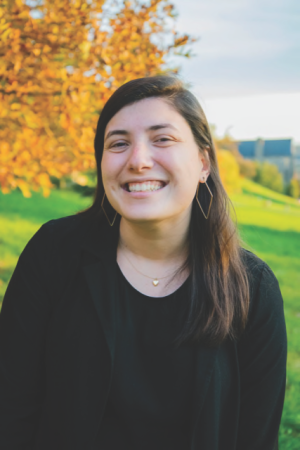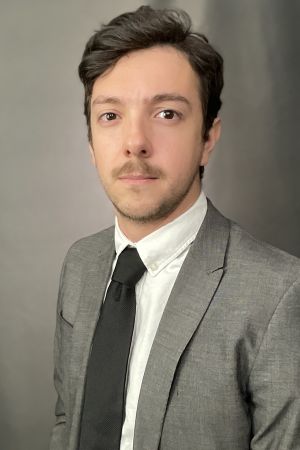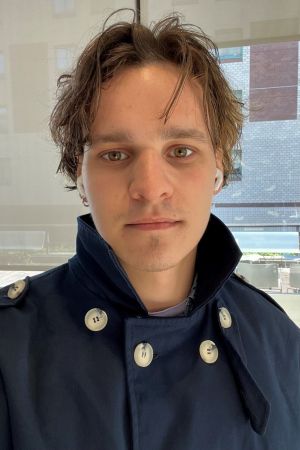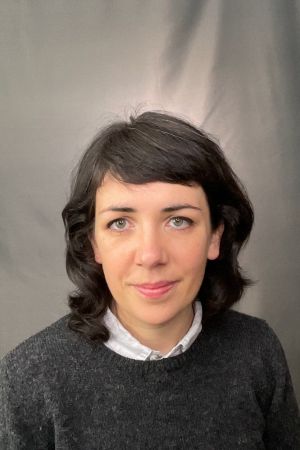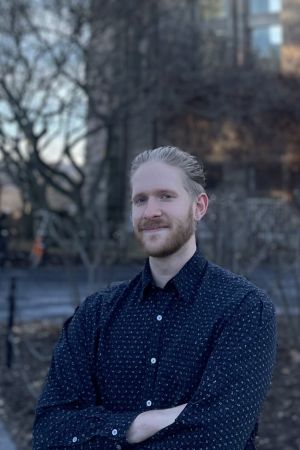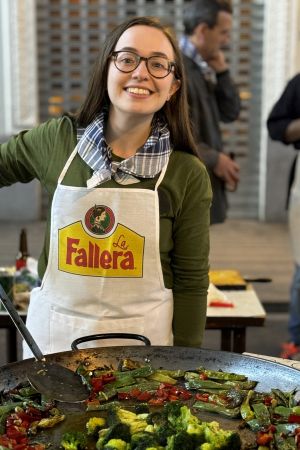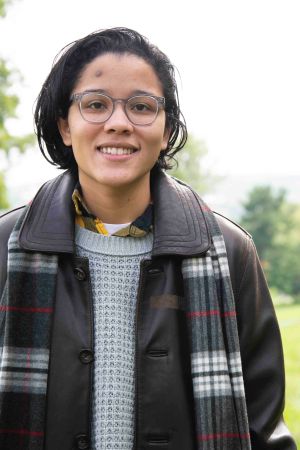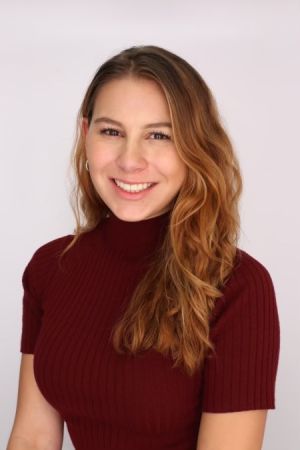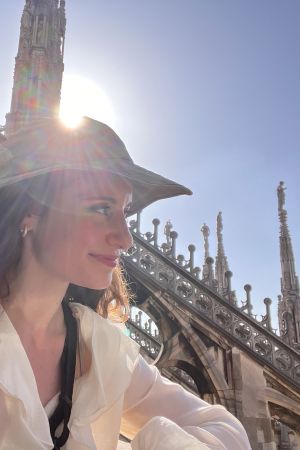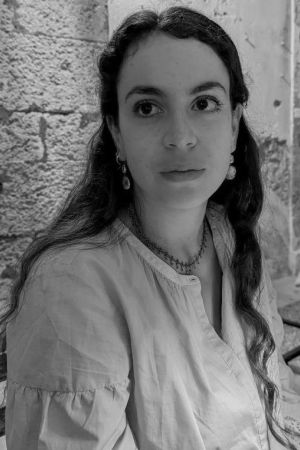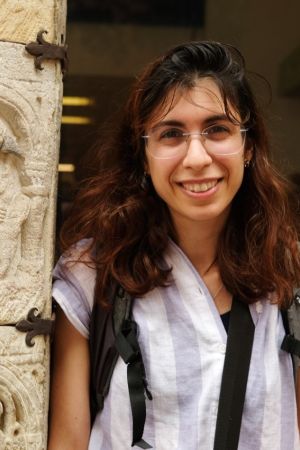Graduate Fellows 2025-26
The Institute for European Studies aims to become a focal point at Cornell for an interdisciplinary European Studies research community.
The IES Fellows will advance their research and contribute to the European Studies community by attending and engaging in IES-hosted talks, and by organizing and taking part in collective activities such as a graduate research workshop or discussion group. The Institute supports these activities with a small research stipend to each Fellow. IES Fellows also receive priority for IES research and travel fellowships. Meet the 2025-26 cohort.
Frances Cayton
Spring Only
Frances Cayton's research focuses on questions surrounding democratic backsliding, civil society, and political communication. Her dissertation, specifically, examines how the underlying level of pluralism in civil society affects the durability and degree of grassroots support available for backsliding incumbents across the Visegrad 4 (Poland, Hungary, Czechia, and Slovakia). IES support has facilitated pre-dissertation language training and fieldwork, and upcoming dissertation fieldwork that will include interviews, focus groups, and surveys.
Duncan Eaton
Duncan Eaton is a PhD candidate in the History Department. His research is concerned with the economic and political history of 19th and 20th century Europe, with a focus on the economic challenges stemming from the dissolution of Austria-Hungary. His dissertation research analyzes the political economy of interwar Czechoslovakia in order to understand the proliferation of autonomist politics among rural Slovaks, particularly following the Great Depression.
Georgy Tarasenko
Georgy Tarasenko is a PhD student in the Department of Government at Cornell University. His major field of study is Comparative Politics, with minor fields in Political Thought and Methods. Previously, he was a researcher and lecturer at the Center for Institutional Studies at HSE University in Moscow and the Digital Humanities Center at ITMO University in Saint Petersburg.
Georgy is generally interested in freedom as both a theoretical and empirical phenomenon, with a particular focus on non-democratic and illiberal politics. One of his research agendas examines wartime politics, specifically investigating Russian mercenary violence in Africa and the impact of casualties in the Russo-Ukrainian war on public opinion. He explores these questions using various interdisciplinary computational approaches, including statistics, machine learning, experiments, archival methods, and GIS.
Kaitlin Findlay
Kaitlin Findlay is a doctoral candidate in the Cornell History Department. Her current research examines forced displacement, humanitarianism, liberal internationalism, and memory in the mid-twentieth century.
Spencer Hadley
Spencer Hadley (he/him/his) is a PhD candidate in the Department of German Studies. His dissertation project carries the provisional heading “Jazz Poetry in German Keys: Race, Gender, Sound and Transnational Exchange Since 1945.” It involves 20th and 21st century German-language poetry, prose and performance and is informed by Literary and Cultural Studies, (Jazz and Popular) Music and Sound studies, and Black European Studies.
Rachel Horner
Fall Only
Rachel Horner (she/her) is a PhD candidate in music and sound studies at Cornell University. She holds an MA in musicology and a BM in vocal music education and Spanish from Rutgers University. Rachel’s research investigates the intersections between sound, language, and identity, especially in the context of Spanish and Latin American cultural festivals. Her dissertation project, tentatively titled “Sentint les Falles: Sounding the Intangible Archive of València’s Falles Festival,” builds on six years of ethnographic fieldwork with musicians, pyrotechnicians, festival participants, and other cultural stakeholders in the Falles Festival of València, Spain. It centers three core domains of sound—language, noise, and music—to reveal how sound acts as a mode of preservation despite its rapid disappearance, generating an intangible archive of feelings, behaviors, and beliefs within and beyond the festival. Through its cycles of presence and non-presence, sound catalyzes the ever-changing intangible archive of the festival and heightens the performance of festive sociability in ways that ripple outward into social life. Rachel is editorial assistant of the quarterly journal American Music and assistant director of Cornell Writing Centers.
Angela Kothe
Angela Kothe is a third-year PhD Student in the Department of Government. Her research interests include Queer politics and religion in Europe and the United States. She is currently developing a project that explores the political economy of Queer identity formation in post-War England.
Madeleine Lemos
Director's Fellow
Madeleine is a historian of modern Europe focused on Spain. Her research focuses on understanding the relationship between fascism and the international via formal and informal political means. She is particularly interested in examining the continuation of the Spanish fascist state as an international and domestic body via Francoism's repositioning of itself throughout the 20th century.
Julia Sebastien
Julia Sebastien is a media psychology researcher and designer exploring the intersection of immersive technology, culture, and humanism through her Ph.D. in Communication at Cornell. In keeping with her ongoing research in Cornell’s Social Media Lab and Virtual Embodiment Lab, Julia investigates how immersive media can activate awe, self-transcendence, empathy, prosociality, and a deeper sense of connection to others and our shared human experience, a specialization she increasingly applies to European cultural and historical contexts.
Most recently, Julia joined the Casa della Regina Carolina Project, where she assisted in the archaeological excavation of an ancient Roman villa in the Scavi di Pompeii, a UNESCO World Heritage Site. Drawing on her master’s degree in immersive learning design from Harvard, she is also contributing to the curation of an immersive digital reconstruction of the villa as it stood in 79 CE, designed for experiential educational purposes.
Previously, Julia conducted a formal evaluation for the Harvard Art Museums, assessing the effectiveness of their digital Art+Science Pathway in communicating how scientific imaging techniques like X-ray analysis reveal hidden layers and material histories beneath classical European artworks and cultural artifacts.
Julia positions emerging technologies as bridges—transporting learners across space, time, and points of view—to transform distant, abstract, or even improbable possibilities into tangible, emotionally resonant learning experiences. It is her defiantly hopeful belief that digital media experiences fostering deep, compassionate engagement with other places, times, and people can deepen our understanding of ourselves, of our history, and our shared responsibility to shape our collective future.
Nora Siena
Nora Siena's dissertation, “Inoperative Brevitas: The Contamination of Short Literary and Philosophical Forms and the Twentieth-century Italian Racconto,” identifies a paradigmatic mode of twentieth-century European poetics and philosophical programs in the disruption of the historical tie between textual brevity and exemplarity. Within the genre of exemplary narratio brevis (exempla, parables, apologues, fables), the formal/rhetorical principle of brevitas has been codified to elicit an allegorical reading connecting the text to a universal truth, norm, or doctrine. Relying on Giorgio Agamben’s concept of inoperativity (a potentiality that is not exhausted in its actualization), she defines as “inoperative brevitas” a category of twentieth-century literary and philosophical forms that exhibit the genre constants of brevitas while withdrawing from its exemplifying function. Focusing on the work of Italian and German philosophers, in her dissertation she argues that the employment of inoperative brevitas in philosophical writing opens new possibilities for rethinking the relationship between universality and particularity and thus the entanglement of language, ethics, and politics. Furthermore, she maintains that the notion of inoperative brevitas illuminates a tendency of the twentieth-century Italian racconto that would otherwise elude any critical definition.
Chiara Visentin
Director's Fellow
Chiara Visentin is a PhD candidate in the Medieval Studies Program at Cornell, with a background in philosophy and sociology. She is interested in the transformations of political cultures, identities and institutions in the central Middle Ages and especially the 12th century, with a focus on the Anglo-Norman and Angevin polities, extending between the British Isles and Western France, as well as their neighbors like Capetian France, and more distant but related polities such as Norman Sicily. She investigates relations between political and educational (ex-)changes as part of the processes that Robert Bartlett referred to as the "making of Europe" through "conquest, colonization and cultural change", especially by means of the multilingual and multiple textual traditions linked to wisdom literature.
Xinyu Zhang
Xinyu H. Zhang is a PhD candidate in the Department of Comparative Literature and holds an M.A. in Icelandic Literature from the University of Iceland. He is a reader of critical theories and Far North literature (Nordic-Scandinavian texts, especially those from Iceland, the Faroe Islands, and Greenland). He seeks to learn from the poignant dialectics between literary history and natural history in narratives of uneasy settlement in the Far North. He has also published on the production of contemporary Icelandic novels in relation to a pervasive “global” atmosphere of techno-environmental-economic anxiety, which is entangled with Iceland’s own postcoloniality. He has translated many works of Icelandic literature into Chinese.
Past Institute for European Studies Graduate Fellows
| 2024-25 | 2023-24 |
|---|---|
| Alican Taylan | Chris Mingo |
| Amelia Arsenault | Emre Susamci |
| Angela Kothe | Francis Cayton |
| Chiara Visentin | Judith Tauber |
| Chris Mingo | Morton Wan |
| Frances Cayton | Savannah Caldwell |
| Madeleine Lemos | Stefan Ivanovski |
| Maria Luisa Palumbo | Thari Zweers |
| Matt Finck | |
| Nora Siena | |
| Priyanka Sen | |
| Rachel Horner | |
| Victoria Phil Sorensen |

